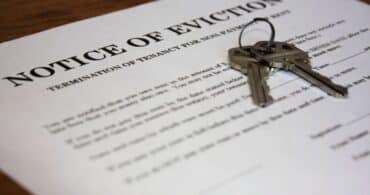In What Circumstances can a Landlord Change the Locks?
When tenants fall into rent arrears or cause damage to a property, it can be tempting for landlords to change the locks to keep them out. However, taking such steps could prove to be a serious mistake, making it all the more difficult to gain the permissions necessary to legally evict a tenant and landing you in trouble with the law. Can a landlord change the locks? Let’s explore the subject in detail.
When tenants fall into rent arrears or cause damage to a property, it can be tempting for landlords to change the locks to keep them out. However, taking such steps could prove to be a serious mistake, making it all the more difficult to gain the permissions necessary to legally evict a tenant and landing you in trouble with the law. Can a landlord change the locks? Let’s explore the subject in detail.
There are certain things that landlords are not legally permitted to do just because tenants have breached their tenancy agreement. These include entering the property without permission, pausing utilities, refusing to carry out repairs, forcibly removing tenants or their belongings signing up new tenants before the current ones have gone, and changing the locks and denying entry.
Is it against the law for a landlord to change the locks?
The law says that tenants have a right to quiet enjoyment of their home. This means that whatever they are doing, you must follow the correct legal procedure. You are not, therefore, allowed to change the locks to keep them out.
Even if you have served your tenant with an eviction notice and they refuse to settle their rent arrears or vacate the property, you are still not permitted to change the locks.
There are only two legal means of evicting a tenant who has stopped paying their rent:
Section 8 notice: this is served under the Housing Act 1988 for a breach of an assured shorthold tenancy agreement.
Section 21 notice: this is served when a tenant is outside of the fixed term of their tenancy.
If you change the locks outside of the law, this is classed as an illegal eviction and it will be looked upon with disdain by a judge, even if you have a valid case against a tenant.
There are a handful of exceptions to the rules, however. These include where a landlord also resides at the property and shares a kitchen or bathroom with the tenant, and where a tenant is not required to pay rent. In such situations, landlords must give reasonable notice to vacate the property. Only after the notice period has expired is the landlord permitted to legitimately change the locks.
When should a landlord consider changing the locks?
If a tenant loses their keys then the security of the property may be compromised and this could affect your landlord insurance. You should therefore in such circumstances change the locks, and you are within your rights to pass the cost on to your tenants. You may only pass the actual charges on, however, as adding costs to the fee would be considered a breach of the Tenant Fees Act 2019.
Tenants are permitted to change the locks themselves at their own cost, and there is no legal obligation for them to give the landlord a key, unless it stipulates as such in the tenancy agreement.
If at the end of a tenancy you do not get the keys back, then this should be considered a security risk and you should go ahead and have the locks changed.
Also bear in mind that keys and locks are subject to wear and tear, so you should consider changing them from time to time, and always ensure they are in good working order between tenancies. Be sure to check that locks are fitted by a professional locksmith, and that they meet the requirements of your insurance provider.
Seeking help managing your rental property? Look to homes2let.
As a landlord, it is often the day to day issues, such as locks and keys, that can prove time consuming to deal with. The ideal scenario is to delegate the day to day issues that take up so much of your time. Step in homes2let.
Courtesy of our guaranteed rent scheme, you get to enjoy everything taken care of, including property maintenance and repairs, mid-term inspections, tenant sourcing and referencing, regulatory compliance and all other daily management tasks. Plus you get the peace of mind of your rent paid in full every month, even during void periods. This is all at no cost whatsoever to you.
To find out more, please feel free to get in touch with our helpful, expert team, offering several years of experience in property lettings and buy to let investment.
Related Insights

How Much Can a Landlord Increase Rent?
As a landlord, there may be times when you would like to increase the rent that you charge your tenants. There is nothing to stop you doing this, but you must follow the correct procedure that is set out by law. Here we delve into the subject of rent increases, asking, is there a limit to how much a UK landlord can raise rent?

The Lowdown on Landlord Insurance
Landlord insurance is designed to cover the specific risks faced when renting buy-to-let property. There are different types of cover that address the various types and levels of risks. It’s important as a landlord to know what’s available in terms of insurance, and to ensure you know what you are, and more importantly what you are not, covered for.

Loophole Means Section 21 Ban Delay “is Not What it Seems” – Claim
Goodlord's Oli Sherlock argues the government's delay on the Section 21 eviction ban is misleading. Despite assurances, some landlords may still serve Section 21 notices. Learn about the potential loopholes.







